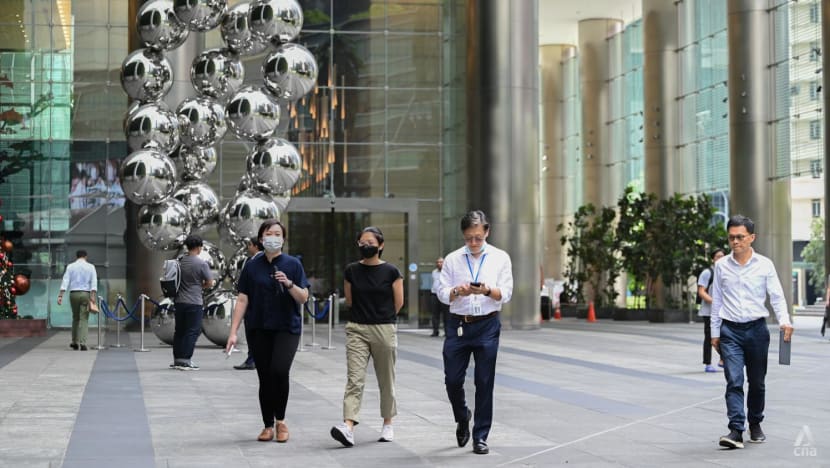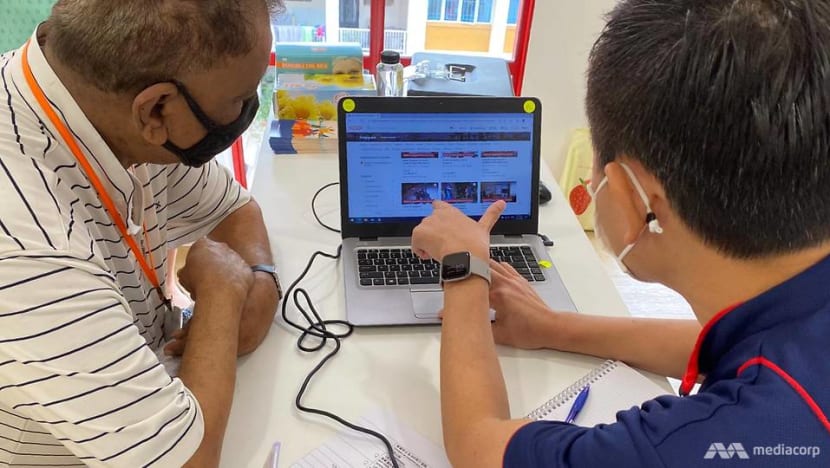Government recovering S$86.2 million in overpayments for COVID-19 grants
About 99.7 per cent of overpayments have been recovered, said MOF and IRAS.

People walking in the Central Business District in Singapore on Nov 16, 2022. (File photo: CNA/Hanidah Amin)
SINGAPORE: The Ministry of Finance and Inland Revenue Authority of Singapore (IRAS) are recovering S$86.2 million (US$65 million) in overpayments for three COVID-19 grants, the authorities said on Wednesday (Jul 19).
The Auditor-General's Office (AGO) report, released on Wednesday, looked at the key COVID-19 grant schemes – the Jobs Support Scheme (JSS), the Rental Cash Grant (RCG), and the Rental Support Scheme (RSS).
Although the AGO audit report found that the schemes were well-designed with the necessary controls in places, it identified several lapses in operational processes and areas for improvement.
"On lapses in operational processes, MOF and IRAS have taken steps to investigate and recover the overpayments," said the agencies.
MOF and IRAS have recovered about 99.7 per cent of overpayments and are working with the entities to recover the rest, they said.
The amount that was to be recovered – S$86.2 million – is less than 0.5 per cent of the total payouts for the three schemes.
"Singapore was dealing with a major disruption during the pandemic. The government had to mount an unprecedented response in terms of size, scope and speed to support our businesses and workers," said MOF and IRAS.
"Public agencies operated under tight timelines and had to manage overlapping waves of policy planning, implementation and review."
Besides the three COVID-19 schemes, the AGO report also flagged issues with the SingapoRediscover Vouchers scheme, including that they were disbursed to ineligible people. This scheme was introduced in 2020 and was managed by the Singapore Tourism Board (STB).
In total, the government spent S$72.3 billion on COVID-19 expenditure in FY2020/21 and FY2021/22.
The spending was for a broad range of measures to safeguard public health and enable the safe reopening of economic activities, and to provide support measures for people and businesses in the form of grants, financial assistance, tax rebates, financing and vouchers.
The AGO carried out thematic audits on COVID-19 spending in two parts.
In the first part, it audited selected COVID-19 related procurement and expenditure at the Ministry of Manpower, Health Promotion Board and Singapore Land Authority. The findings were in last year's AGO report.
In the second part, the AGO covered the schemes managed by IRAS and STB – the JSS, RCG, RSS and SingapoRediscovers Vouchers scheme. In total, the COVID-19 expenditure subjected to AGO's audits was S$33.2 billion.
The AGO found that in general, MOF, IRAS and STB had thought through the scheme design and put in place key processes and controls across the various grant stages to ensure proper management of the schemes. But it also noted that there were areas where improvements could be made.
SINGAPOREDISCOVERS VOUCHERS SCHEME
The SingapoRediscovers Vouchers scheme started on Dec 1, 2020. Under the scheme, Singaporeans aged 18 and above would receive S$100 worth of vouchers that could be redeemed using their Singpass accounts.
These vouchers could be used for hotel stays, attraction tickets and tours offered by approved merchants. Merchants were only allowed to sell products such as tour packages that had met STB’s eligibility criteria.
The AGO noted that STB only had four months to work through the scheme details, operations and processes. This included training more than 100 people, engaging over 400 tourism establishments and identifying suitable booking partners.
The report said STB had put in place several good practices to facilitate the redemptions and processing of voucher transactions.
However, it noted that there were inadequate controls over the onboarding of merchants and checks on the eligibility of products sold under the scheme.

Test checks by AGO found that 12 merchants were onboarded to the scheme even though there were inadequate supporting documents to show that they had met an eligibility criterion on tourist visitorship. A total of S$17.84 million was disbursed to these merchants.
AGO also found that 950 products sold by 37 merchants were onboarded even though there were no product lists submitted by the merchants to STB for eligibility checks.
Disbursements were also made for ineligible people, including Singaporeans who could have made false declarations to enjoy subsidies for children or youths.
Thirty-five redemptions were also made using the Singpass accounts of 30 people who were dead at the point of redemption. Of these, 18 redemptions were made one day to 7.6 months after the date of death registration of the individuals, while 17 redemptions were made on the date of death registration.
Related:
In a separate press release, STB said it has taken steps to review and tighten its processes based on the audit observations made by the AGO.
"The key observations were on inadequate controls to ensure that the SingapoRediscovers grants were not disbursed to ineligible persons, and only eligible merchants and products were onboarded to the scheme," said STB.
"While STB had implemented checks to prevent abuse and detect wrongdoing, we recognise that some of the processes could have been more stringent."
It said it will take "appropriate action" against people who made ineligible redemptions.
JOBS SUPPORT SCHEME
The government announced the JSS in February 2020 to provide wage support to help employers retain local employees, during the period of economic uncertainty caused by COVID-19.
The payout was originally set at 8 per cent of gross monthly wages but was subsequently enhanced as the pandemic worsened globally and in Singapore. A total of S$29.38 billion in JSS grants was disbursed between Apr 1, 2020 and Jun 30, 2022.
AGO noted that despite the short timeframe given for the implementation of the schemes, MOF and IRAS had implemented several good practices to ensure that the grant schemes were administered in accordance with the grant objectives and that grant payouts were given to the intended recipients.
But it said MOF and IRAS could improve by ensuring adequate documentation of key considerations and decisions taken following risk assessment during the scheme design stage of the scheme.
They could also strengthen controls over the evaluation and approval of appeals to ensure that the assessment was adequately substantiated, the evaluators were clearly indicated in the submissions for approval, and that there was proper documentation of approval by the approving authority.
AGO also said MOF and IRAS could have proper version control for scripts used for anti-gaming checks and better documentation on the assessment and approval of the risk scenarios. They could also improve the monitoring of recovery of excess payouts and ensure the timeliness and accuracy of recovery.
RENTAL CASH GRANT, RENTAL SUPPORT SCHEME
In addition to the JSS, IRAS managed two rental grant schemes, namely the RCG and RSS. The RCG was announced in May 2020 to mandate equitable co-sharing of rental obligations among the government, landlords and tenants.
The RSS was introduced a year later in May 2021, solely for commercial properties as they were more affected by tightened measures during the Phase 2 Heightened Alert period.
In the report, AGO noted that IRAS quickly developed a property tenant-occupier network model that leveraged its existing IT infrastructure and data to facilitate automatic grant disbursements. That enabled IRAS to process a large number of disbursements within a short period of time.
Multiple checks were also put in place to ensure the correct grant allotments and disbursements, including built-in controls in the system and independent checks by its internal audit – prior to grant disbursements – to identify discrepancies and duplicate allotments for follow-up.
But the AGO highlighted that there was no documentary evidence of approval by MOF on the risk assessment and key factors considered in the scheme design for the RCG. There was also no documentation on the acceptable level of risks.
Without such documentary evidence, there was inadequate assurance that the risk assessment and consideration of key factors were approved by MOF prior to the implementation of RCG.
The evaluation of rental grants could also be improved, the AGO report said. There were lapses in 55 allotments, including the wrong evaluation of grant eligibility, incorrect computation of grant amount and inadequate substantiation of the evaluation.
As a result, there were estimated excess and shortfall in grant disbursements totalling S$8.01 million and S$0.48 million respectively.
In a separate press release, MOF and IRAS said they have taken immediate rectification steps where relevant.
"On documentation, MOF and IRAS acknowledge that there is scope to improve the documentation of processes and risk assessments," they said.
"While documentation may not have been complete due to fast-moving developments and time constraints then, MOF and IRAS affirm that each decision was duly deliberated and will ensure better documentation for future schemes."
The authorities added that they have taken steps to investigate and recover the overpayments.
"MOF and IRAS acknowledge, as part of good governance, that there is scope for the internal processes highlighted in the AGO report to be further tightened and strengthened," they said.
"We have since put in place additional policies and procedures to do so. These, coupled with the strong teamwork and can-do spirit that undergirded the design and delivery of COVID-19 schemes, will help us learn, improve and better prepare for future crisis situations."
















